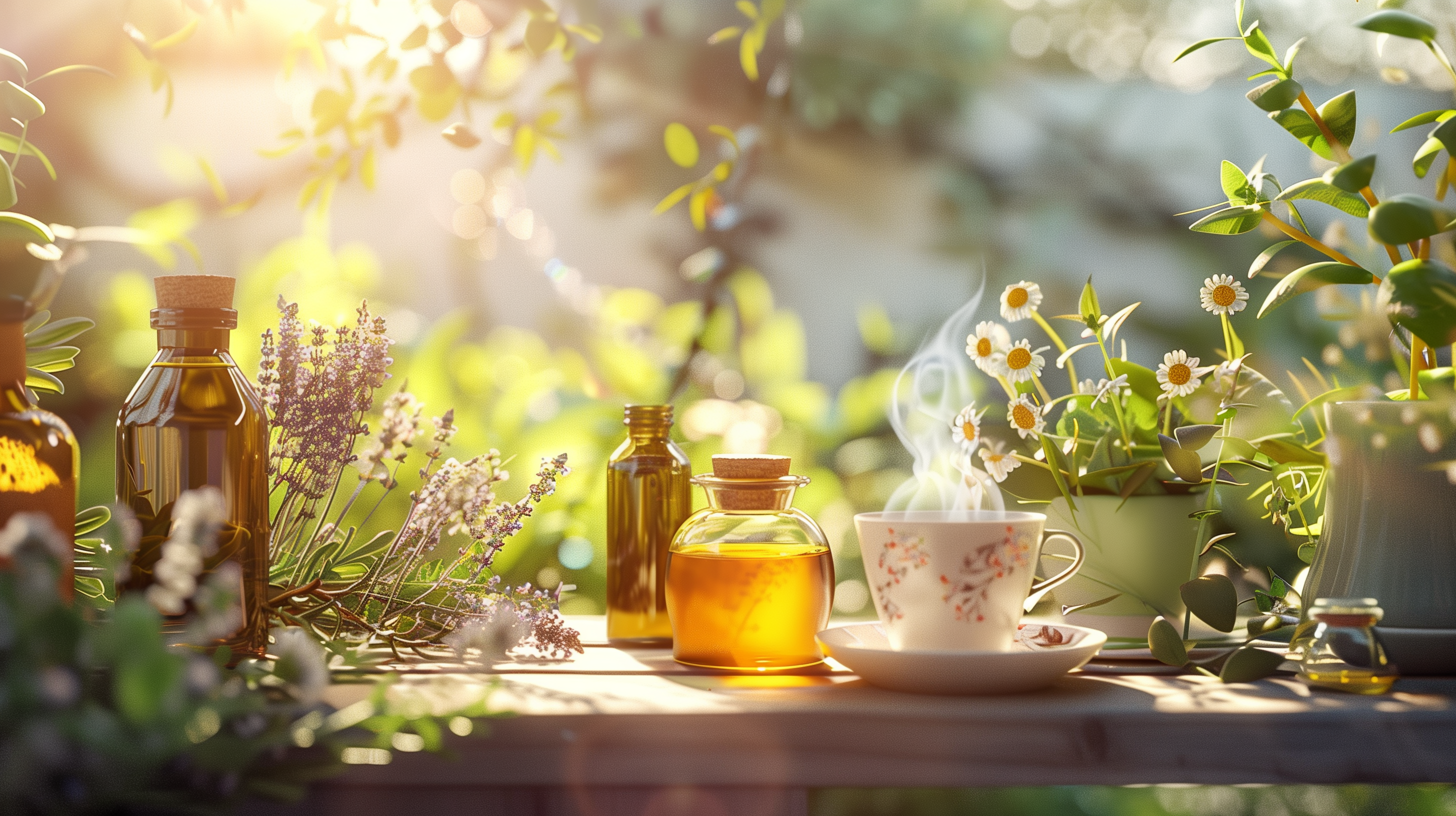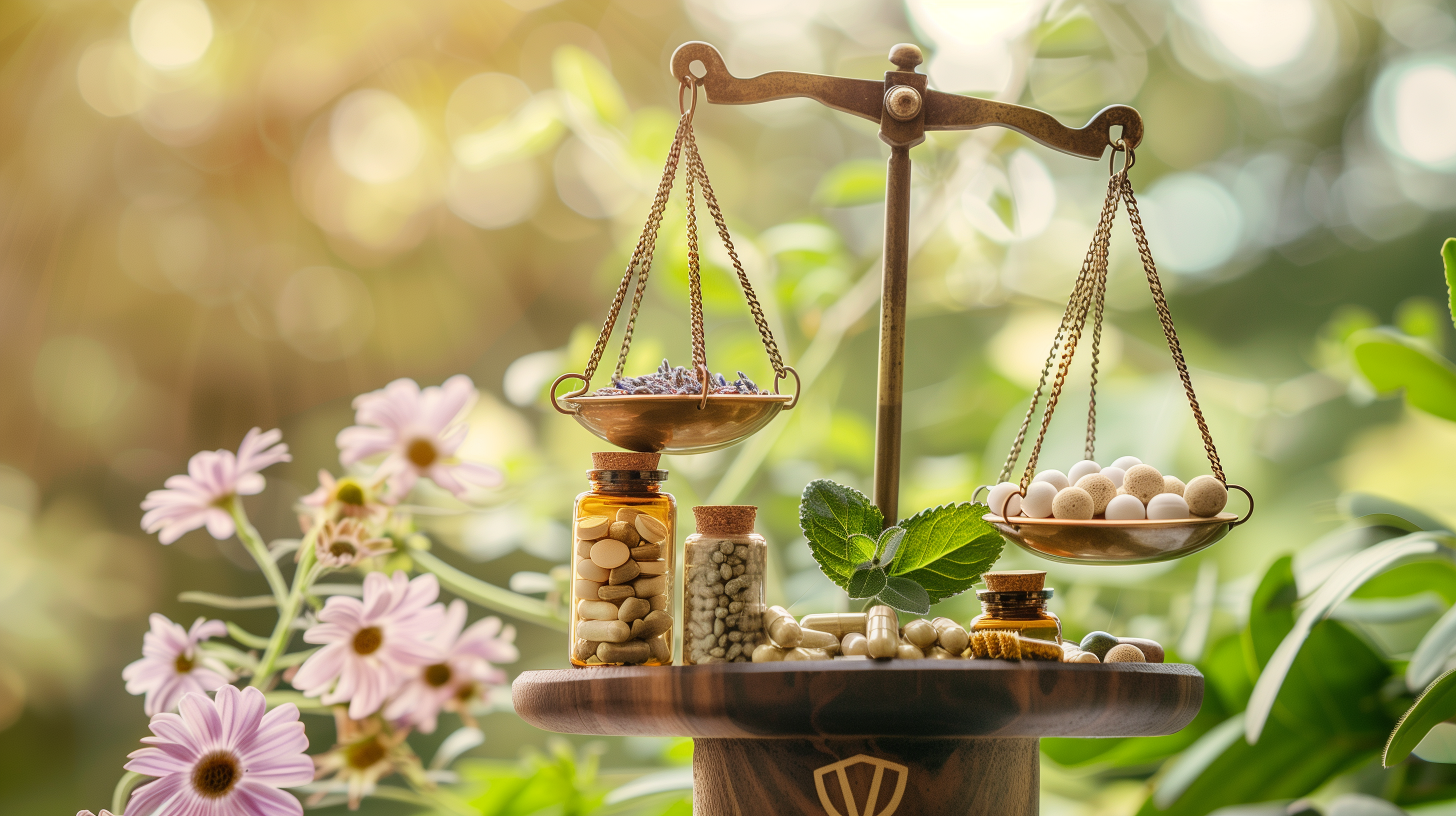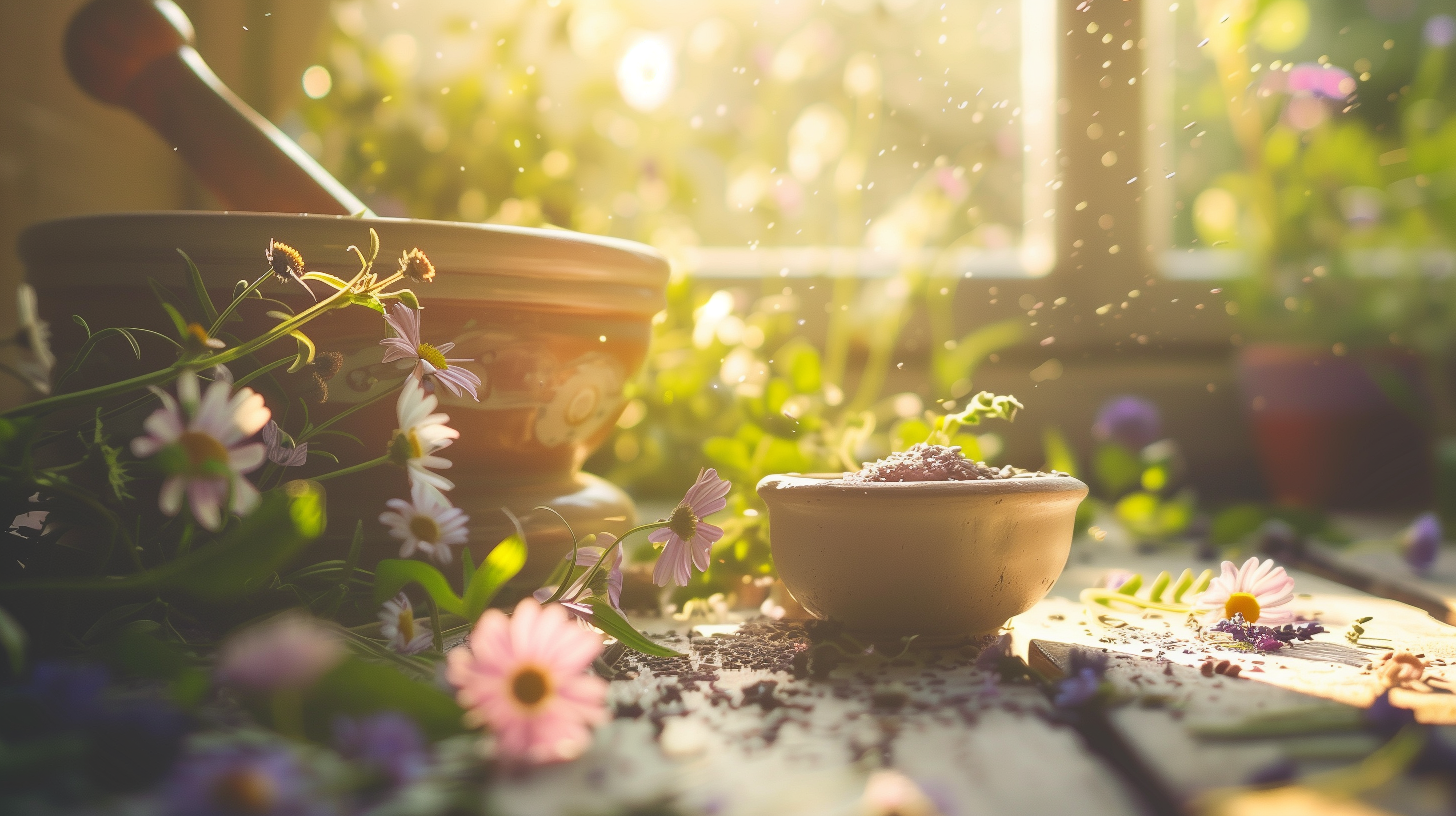You're facing a world brimming with stressors, yet nature provides solace through herbal supplements. Ashwagandha and chamomile, among others, serve as natural balms, modulating cortisol—the body's stress hormone—and fostering calm. These botanicals, grounded in scientific research, help regulate stress hormones and enhance your overall sense of well-being by improving mood and sleep quality. Each herb, from the adaptogenic ashwagandha reducing cortisol levels to the calming effects of chamomile on anxiety, offers a holistic approach to stress management. Consulting a healthcare professional guarantees safe and effective use, tailored to your unique needs. Discovering the right blend could transform your stress management strategy.

Key Takeaways
-
Ashwagandha, an adaptogen, effectively reduces cortisol levels and enhances sleep quality for stress relief.
-
Chamomile offers calming properties, making it beneficial for managing anxiety and promoting relaxation.
-
Valerian root promotes sleep and relaxation, aiding in stress reduction and anxiety management.
-
Lavender and Passionflower have calming properties that provide short-term relief from anxiety.
-
Melatonin supplements regulate sleep patterns, which is crucial for managing stress and improving overall well-being.
Understanding Herbal Supplements for Stress
Herbal supplements, such as ashwagandha, rhodiola rosea, and melatonin, play a pivotal role in mitigating stress by modulating cortisol levels and fostering a state of calm. These natural remedies are integral to a holistic approach to stress management, working at the biochemical level to improve mood, regulate hormones critical in the body's stress response, and enhance overall well-being.
Understanding how these supplements interact with your body's physiology requires a scientific perspective. Cortisol, often referred to as the 'stress hormone,' has a significant impact on your body's stress response. By regulating cortisol levels, herbal supplements can contribute to a more balanced emotional state and improved stress resilience. However, it's important to acknowledge that the effectiveness of these supplements can vary significantly among individuals, and their interactions with medications may necessitate careful consideration.
Seeking professional guidance before incorporating herbal supplements into your regimen is essential. A healthcare provider can offer insights into how these supplements can complement your current health status and medication regimen. This step ensures the safety of supplement use and maximizes their efficacy as part of a holistic strategy for managing stress.
Best Vitamins and Supplements for Stress Relief

In recent years, various adaptogens and natural compounds have emerged as effective stress relievers, offering a holistic and scientifically supported approach to managing your stress levels. If you're exploring natural ways to alleviate stress, consider incorporating these top herbal stress relievers into your routine:
-
Ashwagandha: Recognized as an adaptogen herb, Ashwagandha has been shown to help reduce cortisol levels and improve sleep quality. Its ability to aid in stress relief is backed by scientific research, making it a powerful tool in your stress management arsenal.
-
Chamomile: This herb, often enjoyed as tea, has been studied for its effectiveness in managing generalized anxiety disorder. Its calming properties can help soothe your mind, offering a natural way to combat anxiety.
-
Valerian: Although lacking high-quality studies, Valerian has a long history of use for improving sleep and reducing anxiety. It's considered by many as a natural remedy for promoting relaxation and easing stress.
-
Lavender and Passionflower: Both containing calming properties, Lavender and Passionflower are effective for short-term anxiety relief. Lavender, with its calming terpenes, and Passionflower, known for aiding restlessness and nervousness, provide a dual approach to stress relief.
Benefits of Herbal Therapy
Exploring the top herbal stress relievers offers a foundation; now let's examine how herbal therapy can greatly reduce anxiety, enhance sleep quality, and bolster stress resilience. Herbal therapy's multifaceted approach integrates natural supplements like ashwagandha, rhodiola rosea, and melatonin, which are pivotal in regulating stress hormones. These botanicals are not just traditional folklore; they're backed by scientific research indicating their efficacy in promoting relaxation and mental well-being.
The benefits of herbal therapy extend beyond mere symptom management. By targeting the root causes of stress, these natural remedies support long-term mental health and cognitive function. Ashwagandha, for instance, is renowned for its adaptogenic properties, aiding the body in adapting to stress and mitigating anxiety. Similarly, rhodiola rosea is celebrated for its ability to enhance stress resilience, providing a shield against the physical and psychological impacts of stress.
Melatonin's role in improving sleep patterns is indispensable. Good quality sleep is foundational to stress management, and by regulating the sleep-wake cycle, melatonin fosters a conducive environment for both relaxation and recovery. Embracing herbal therapy offers a holistic path to reduced anxiety, improved sleep, and fortified stress resilience, making it a compelling component of stress relief strategies.
Herbal Supplement Safety

While the allure of natural remedies is undeniable, it's essential to recognize that the lack of FDA regulation for herbal supplements poses significant safety and quality concerns. When seeking relief from stress through herbal means, you're venturing into a space where the balance between benefits and risks must be carefully navigated. Here's what you need to keep in mind:
-
Consultation with a Health Professional: Before incorporating any herbal supplements into your routine, it's important to discuss your plans with a medical professional. They can provide insight into potential interactions with existing medications and advise on appropriate dosages.
-
Awareness of Interactions: Some herbal supplements can interact with medications, leading to undesired effects such as increased drowsiness or sedative impacts. Understanding these interactions is crucial for your safety.
-
Quality Control: The variability in quality of herbal products calls for improved regulation. Seek out supplements from reputable sources that adhere to voluntary quality standards.
-
Natural ≠ Safe: Remember, just because a product is natural does not automatically make it safe. Weighing the potential risks against the benefits with a health professional can guide you toward making informed decisions about using herbal supplements for stress relief.
Incorporating Herbs Into Your Lifestyle to Manage Stress

Understanding the importance of safety and quality in herbal supplements lays the groundwork for effectively incorporating these herbs into your lifestyle for stress relief. Herbs like ashwagandha and lavender have been recognized for their ability to mitigate stress and anxiety by interacting with your body's stress response systems. This interaction fosters a state of relaxation and enhances overall well-being, offering a natural and holistic approach to stress management.
Consultation with a healthcare provider is essential to incorporate herbs into your lifestyle safely and effectively. They can guide you on the appropriate use of herbal supplements, ensuring they complement your body's needs and any other treatments you may be undergoing. Remember, the goal is to seamlessly integrate these herbs into your lifestyle alongside other stress-relieving practices such as exercise and relaxation techniques.
Conclusion

In summary, incorporating herbal supplements into your lifestyle can provide a natural pathway to managing stress. Consider John, for example, who experienced significant relief from daily tensions by consistently using ashwagandha, showcasing the fusion of science and tradition in promoting well-being. It's important, however, to approach this holistic journey with awareness of safety and personal health conditions. By doing so, you're embracing nature's bounty and paving the way for a balanced, stress-reduced life.
Vitamins and Supplements for Stress FAQs
Q: What are herbal supplements for stress relief?
A: Herbal supplements for stress relief are natural products made from herbs that are believed to help reduce stress and anxiety levels.
Q: How do supplements for stress work?
A: Supplements for stress usually contain ingredients that are thought to have a calming effect on the body, helping to reduce stress and anxiety symptoms.
Q: Are vitamins and supplements effective in managing stress?
A: Some vitamins and supplements, like B vitamins, are believed to help manage stress and support overall well-being.
Q: What are the best vitamins for stress relief?
A: The best vitamins for stress relief include B vitamins, magnesium, and vitamin D, which are known to play a role in stress management.
Q: How can vitamins and supplements help reduce stress?
A: Vitamins and supplements for stress can help reduce stress by supporting the body's nervous system, promoting relaxation, and reducing anxiety levels.
Q: Can supplements for stress also help with symptoms of anxiety?
A: Yes, some supplements for stress are believed to help reduce symptoms of anxiety and promote a sense of calmness.
Q: Are there any side effects associated with taking herbal supplements for stress relief?
A: While herbal supplements are generally considered safe, they may cause side effects in some individuals. It is important to consult with a healthcare provider before starting any new supplement regimen.
Q: What Is the Best Herb to Reduce Stress?
A: If you're seeking the best herb for stress reduction, consider Ashwagandha. It's renowned for lowering cortisol and boosting sleep quality, making it a top choice for easing stress and enhancing overall well-being.
Q: What Are the Best Supplements for Stress?
A: If you're seeking the best natural supplement for stress, consider Ashwagandha. It's renowned for lowering cortisol and enhancing sleep. Alternatives include Rhodiola Rosea for energy, Melatonin for sleep regulation, Magnesium, and B Vitamins for mood.
Q: How Can I Calm My Stress Naturally?
A: To naturally soothe your inner storms, consider a blend of lifestyle changes and nature's bounty. Engaging in mindfulness, alongside consuming scientifically backed herbs like ashwagandha, can harmonize your stress levels, promoting a serene mind and body.
Q: What Is the Best Calming Supplement?
A: You're asking about the best calming supplement, and it's a tie between Ashwagandha, which lowers cortisol and improves sleep, and Rhodiola Rosea, which boosts energy while managing stress hormones. Both have unique benefits for stress relief.























